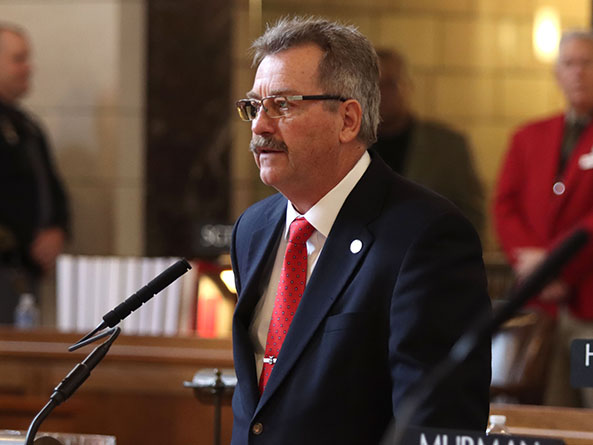Session Review: Natural Resources
Bills supporting Nebraska’s efforts to be selected as a regional clean hydrogen hub, authorizing a state agency to use alternative contracting methods and increasing Nebraska Oil and Gas Conservation Commission members’ pay were among those advanced by the Natural Resources Committee this session.
Omnibus bill
LB565, introduced by Brainard Sen. Bruce Bostelman and passed 41-0, states legislative intent to appropriate $500,000 over the next two fiscal years to the state Department of Economic Development.
The department will use the funds to provide grants to a public power district serving the majority of the counties in the state for engineering and modeling needed to apply for a federal program intended to accelerate the use of hydrogen as a clean energy source.
Lawmakers amended the bill to add provisions of several other measures considered by the committee this session, including LB217, introduced by Sen. Jana Hughes of Seward, which extends the sunset date for a scrap tire project grant program under the Waste Reduction and Recycling Incentive Act from 2024 to 2029.
The provisions of LB289, sponsored by Bostelman, authorize municipal agencies to own and operate, contract to operate or lease advanced metering infrastructure technology and provide advanced metering infrastructure services to public utilities.
The measure also authorizes the agencies to provide certain services, including information technology and physical infrastructure management, to public utilities and municipal infrastructure systems.
The provisions of LB395, introduced by Bayard Sen. Steve Erdman, repeal the $4,000 annual cap on compensation for members of the Nebraska Oil and Gas Conservation Commission and increase members’ maximum daily compensation from $400 to $500. The bill also adjusts the amount for inflation every other year, beginning in 2025.
Under the provisions of LB400, introduced by Sen. Tom Brewer of Gordon, a private landowner or tenant may kill any predator preying on livestock or poultry or suspected of causing other damage on their land without a permit from the state Game and Parks Commission.
The measure also allows private landowners or tenants to kill a mountain lion that is in the process of stalking, killing or consuming livestock on their property without prior notice to the commission or permission from it.
The provisions of LB425, introduced by Bostelman, increase the number of Game and Parks Commission members needed for a quorum at the commission’s public meetings from four to five.
Among other changes, the proposal also increases caps on certain nonresident hunting and fishing permits and allows the commission to issue permits for the taking of elk from state game refuges when their number is deemed detrimental to habitat conditions on the refuges or to adjacent private property.
The provisions of LB567, also sponsored by Bostelman, repeal current law prohibiting individuals in certain high-level managerial positions at a public power district from serving as a member of any public power district’s board of directors.
The provisions of LB568, introduced by Bostelman, require the state Department of Economic Development to create a work group to determine the workforce training needs of the nuclear and hydrogen industries.
The department will establish procedures and criteria for awarding grants to community and state colleges that implement courses designed to alleviate the workforce training needs of those industries. Grants may be used for equipment, curriculum, programming or marketing.
The measure also requires the state treasurer to transfer $200,000 in state general funds to a new fund used to provide per diems and travel and lodging reimbursement to certain work group members.
LB723, sponsored by Bostelman at the request of Gov. Jim Pillen, allows the state Department of Natural Resources to use public-private partnerships and design-build, progressive design-build and construction manager-general contractor project methods when contracting for public surface water or groundwater-related infrastructure projects.
The department also must pay a stipend in an amount determined at its discretion to qualified design builders that submit proposals but are not selected — giving the department ownership of the intellectual property contained in those proposals.


